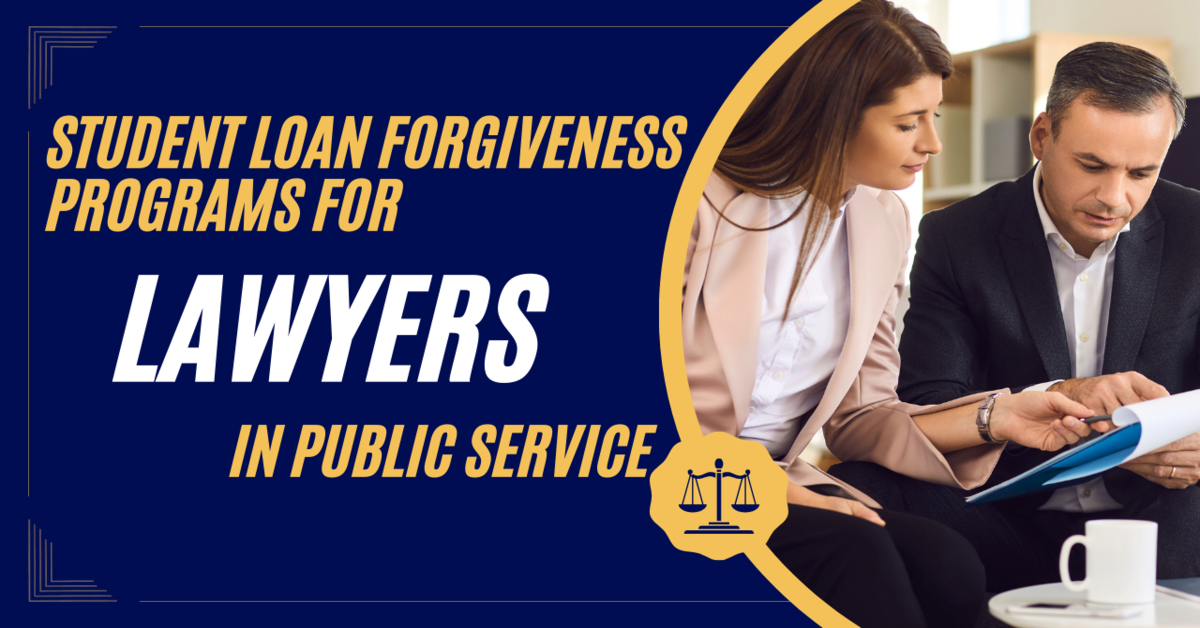With the cost of law school averaging over $100,000 for recent graduates, pursuing a career in public service law can be financially challenging. However, through federal, state, law school, and employer programs, attorneys committed to serving the public have pathways to receiving repayment or forgiveness support to manage educational debt. By taking advantage of these programs, lawyers can fulfill their commitment to the public good without being burdened with student loan debt.
Federal Loan Forgiveness Programs
Public Service Loan Forgiveness (PSLF)
The Public Service Loan Forgiveness (PSLF) program offers loan forgiveness to borrowers with Federal Direct Loans after 120 qualifying monthly payments while working full-time for a government organization or 501(c)(3) nonprofit. Any payment made under an income-driven repayment plan is eligible, such as payments made under a 10-year standard repayment plan. After ten years of on-time monthly payments, attorneys can apply to have their remaining federal student loans discharged tax-free.
To qualify for PSLF, attorneys must work for a qualifying public service employer. This includes all federal, state, local, and tribal government organizations. Lawyers working in 501(c)(3) designated nonprofit organizations are also eligible. The work can be of any title as long as it is full-time, which is defined as at least 30 hours per week. Lawyers must also have Federal Direct Loans, including Stafford, Graduate Plus, Parent Plus, and Federal Consolidation Loans. Other types of federal loans, such as Perkins loans, can become eligible for PSLF when consolidated into a Direct Consolidation Loan.
In addition to full-time public service work, attorneys must make $120 qualifying monthly payments to meet the amnesty deadline. Under PSLF rules, a qualifying payment made after October 1, 2007, on an eligible Federal Direct Loan while employed full-time in a public service job. To qualify, payment must be made within 15 days of the due date and for the full amount shown on the statement.
PSLF has the potential to waive off large loans outstanding of lawyers committed to public service over a long period. For example, an attorney with $200,000 in federal student loans could potentially have their entire balance forgiven after ten years of qualified public interest legal work and timely monthly payments.
To track eligible PSLF payments, attorneys must complete and submit an Employment Certification Form annually or when changing employers. This is the only way to guarantee that eligible payments count up to the required 120. Advocates can use the PSLF Help tool to find eligible employers and view payment progress. After making the 120 qualifying payments, attorneys submit a PSLF application to receive loan forgiveness.
Also Read – Student Loan Forgiveness For Non-profit work: Everything You Need to Know in 2024
John R. Justice Student Loan Repayment Program
John R. Justice (JRJ) Student Loan Repayment Program provides student loan repayment assistance exclusively to state and federal public defenders and state prosecutors working for a government agency.
The program is federally funded and administered by state agencies, which receive an annual allocation of funds based on their populations. States then distribute the funds to eligible public attorneys who apply. There is no guarantee that funds will be available in all states each year.
Applicants must be employed full-time as a state public defender, federal public defender, or state prosecutor. This includes working as an appellate public defender, an assistant public or district attorney, or even a supervisor overseeing qualified attorneys. The state or local government must directly employ lawyers. Those working for private, nonprofit public defenders or legal aid offices are not eligible.
John R. Under the rules of the Justice program, lawyers can receive benefits of up to $10,000 per calendar year, with a lifetime maximum of $60,000. The funds must be used to repay outstanding federal student loans, which can include Direct Loans, Perkins Loans, and more. The amount received is not taxable income.
To qualify for benefits, lawyers must commit to serving as a qualified public interest lawyer for at least three years. State administering agencies determine eligibility requirements beyond the federal minimums, application deadlines, and processes, and how program funds are distributed among applicants.
This program can make a meaningful dent in student loan balances for attorneys committed to long-term careers as prosecutors and public defenders. For example, a public defender with $150,000 in law school loans could potentially receive $30,000 over three years, reducing the overall repayment burden.
HERBERT S. GARTEN Public Interest Lawyer Loan Repayment Assistance
The Legal Services Corporation (LSC) oversees this loan repayment assistance program for lawyers working in legal aid organizations serving low-income clients. The program is named for former LSC board member and founder of the Early Loan Repayment Assistance Program, Herbert S. Named after Garten.
The Garten Program does not provide direct repayment assistance. Instead, it issues annually forgivable loans that recipients use to make payments on their student loans. These forgivable loans are renewable annually for up to three years as long as the attorney remains in good standing.
Lawyers are eligible to apply if they work full-time for an LSC-funded legal aid organization and have at least $75,000 in law school dues. Applicants must also meet income limits based on taxable income and family size. Importantly, lawyers cannot work for an eligible employer for more than five years.
Each year, approximately 70 to 80 attorneys are selected for the forgivable loan program through a lottery process. Recipients can receive up to $5,600 per year in forgivable loans for three years, for a total of $16,800 in potential aid. The loan must be used to pay off outstanding educational debt and is forgiven in full if the attorney remains employed in an LSC-funded job for the full-year period.
State Loan Forgiveness and Repayment Programs
In addition to federal options, many states have implemented their own loan forgiveness and loan repayment programs to encourage and support attorneys pursuing public interest legal careers. State agencies, state bar foundations, or other entities administer these programs. Most offer repayment or forgivable loan benefits to attorneys working for district attorneys, public defenders, legal aid, and other public interest law offices.
Eligibility requirements, application processes, and benefits provided vary widely between state repayment programs. For example, the Florida Bar Foundation awards up to $5,000 per year in forgivable loans to public interest lawyers. At the same time, Mississippi’s LRAP offers $5,000 in loan repayment grants that do not need to be repaid.
Some examples of state programs that provide loan benefits include:
– District Attorney of New York and Indigent Legal Services Attorney Loan Forgiveness Program: Up to $20,400 in education loan relief.
– Texas Lawyers for Texas Veterans LRAP: Annual forgivable loans of $2,500 – $5,000.
– Tennessee District Public Defender Conference LRAP: Maximum lifetime benefit of $60,000.
– Maryland LRAP for Judicial Law Clerks: Provides repayment assistance up to a total of $70,000.
To learn about program options in your state, lawyers can consult databases such as Equal Justice Actions, contact your state bar association, or reach out directly to your state Office of Public Defender/Legal Aid Services.
Law School Loan Repayment Assistance Programs (LRAPs)
Recognizing the financial constraints presented by educational debt for law graduates considering public interest careers, many law schools have created Loan Repayment Assistance Programs (LRAPs). These programs are intended to reduce the debt burden for alums working in eligible public interest positions, particularly nonprofit organizations and government agencies.
As of 2018, more than 120 US law schools offer LRAP. The structure and benefits of these school repayment programs vary. Most offer loan repayment assistance in the form of annual forgivable loans. Typical maximum repayment amounts fall in the range of $3,000-$5,000 annually.
To qualify for the law school LRAP, lawyers must work for a qualifying public interest employer and earn below a specified income level. Each LRAP sets specific eligibility rules and requirements – factors such as the number of years out of school, eligible employer list, and application deadlines vary by school. The ABA maintains a directory of law school LRAP programs.
Duke Law School offers a specific example of a strong loan repayment assistance program:
– Alumni making less than $70,000 at a 501(c)3 or government agency can apply.
-Forgivable loans up to $5,000 annually are available.
– $ 40,000-lifetime maximum repayment amount.
-Participants make affordable monthly payments, as little as $20, and the school pays the balance.
By providing a renewable source of repayment assistance, LRAP enables law schools to encourage alums to pursue meaningful public interest careers. Graduates interested in this path should research their school’s program early in their job search.
Private Law Firm and Employer Loan Repayment Assistance
Loan repayment assistance is emerging as an employee benefit that is being offered by some private sector employers looking to recruit top legal talent. These programs help reduce the burden of education debt, allowing employers to better compete for lawyers against public interest sector jobs with built-in forgiveness incentives.
Examples of private firms with repayment assistance benefits include:
– Orrick’s LRAP provides $100,000 in repayment assistance to associates working in the public interest for 3-6 months.
– Goodwin Procter’s LRAP with $25,000 in loan repayment assistance for associates working part-time in the public interest.
– Morrison & Foster’s Associate LRAP with a 3-year fellowship including $75,000 loan repayment and $50,000 salary.
Even lawyers not interested in big firm life can find loan repayment assistance at in-house legal departments, tech companies, banks, and other large private enterprises. Lawyers should research and negotiate repayment assistance or educational bonuses during the job offer process. Employer repayment assistance provides another opportunity to manage law school debt while advancing one’s career.
Key Points for Lawyers Seeking Loan Forgiveness
Finding the right loan forgiveness or repayment program requires research and an understanding of the eligibility requirements. Key factors for lawyers to consider include:
– Loan Type – Most programs only apply to federal student loans. Some legal aid can assist with LRAP personal loans. Know your loan portfolio before you apply.
– Type of Employer – Public Service LRAP is required for nonprofit 501(c)(3) or government employers. Research whether your organization qualifies.
– Term and conditions of service – Many programs require multi-year commitments, such as ten years for PSLF. Know the deadlines before applying.
– Application process – deadlines, lottery systems, and competitive selection processes vary by program. Follow the instructions closely.
-Renewability – Options like the PSLF offer one-time forgiveness, while other options like the Law School LRAP require annual reapplying.
– Tax implications – The amount forgiven under PSLF and other programs is tax-free, while forgiveness under income-driven repayment plans may be taxable.
Public service lawyers should explore federal, state, law school, and private employer repayment and forgiveness programs as early as possible in their careers. By understanding the benefits available and strategically leveraging these programs, lawyers can pursue their passion for public interest law without being burdened with heavy debt.
Conclusion
With educational debt placing a significant burden on many lawyers’ careers, loan forgiveness and repayment programs at the federal, state, law school, and employer levels are invaluable in supporting public service lawyers. Lawyers who use these programs strategically can benefit from repaying their loans while pursuing a path of meaning and positive social impact through public interest law. Dedicated lawyers in public defense, legal aid, prosecutors’ offices, and government agencies ensure access to justice and play a vital role in our communities. Loan forgiveness programs help make these careers more sustainable.


Awsome info and straight to the point. I don’t know if this is truly the best place to ask
but do you guys have any thoughts on where to get some professional writers?
Thank you 🙂 Lista escape roomów
Howdy! I’m at work browsing your blog from
my new iphone 3gs! Just wanted to say I love reading through your blog and look forward to all your posts!
Keep up the outstanding work!